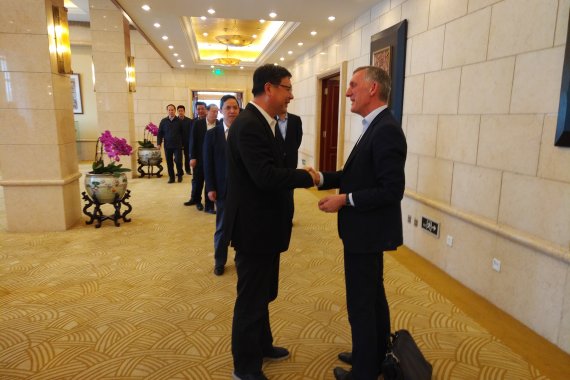Mol and Chen shaking hands. © Vincent Koperdraat
The plans are still at an early stage, Mol emphasises. It is likely that an innovation park will be developed sixty kilometres east of the centre of the capital, where the China Agricultural University (CAU), research institutes, food companies and experimental companies will work together. Additionally, the Chinese partners were charmed by WUR’s Dairy Campus and horticultural innovation centre in Bleiswijk. That is why mayor Chen Jining asked WUR to develop the plan for the innovation park.
Environment
Mayor Chen mainly wants to improve the quality of the food around the capital and combine this with environmental protection and recreation in the outer areas, Mol explains. He has known the mayor of Beijing for some time, as they have collaborated when Chen still worked as professor of Environmental Systems Analysis at Tsinghua University. ‘He has a good name among environmental scientists in China and has been very committed to the environment as the Chinese Minister of Environmental Protection.’
No investment
‘It is a great honour that we have been asked to develop this’, says Mol. WUR will prepare suggestions as to which parties could benefit from collaboration in the innovation park. This might result in new research projects. But WUR will not invest in the park. ‘Our Chinese counterparts should develop the park and ask companies to join. We do not want a Groningen model.’ By this, the rector refers to the University of Groningen’s cancelled investment in the campus in Yantai, China. WUR does not aspire to develop branches abroad, but it does wish to collaborate at an international level.
Food production
Six years ago, WUR attempted a collaboration with Beijing. The president of the executive board at the time, Aalt Dijkhuizen, signed a MoU (memorandum of understanding) with the previous mayor of Beijing to improve and enlarge the food productions around the Chinese capital. The mayor wanted to increase the city’s self-sufficiency and wanted to develop modern horticultural and poultry centres around Beijing, aided by Wageningen knowledge. The contracts for research and innovation amounted to somewhere between 25 and 30 million euros.
Counterpart
But these contracts never came to be, states Xiaoyong Zhang, WUR’s Manager International Cooperation China. What was missing at the time was a Chinese counterpart that was able to develop and build the innovation centres. ‘You need an organisation that owns the project’, says Zhang.
And so, WUR does not merely want to make plans about how a circular agriculture with quality products and recreation could be realised around Beijing but also demands clarity about practical aspects, such as: which parties are the proprietors of the innovation park, and how will Beijing compensate for the knowledge from Wageningen? Zhang hopes that these practical matters will be solved by the time mayor Chen visits Wageningen in autumn of this year. Chen and Mol are supposed to make concrete arrangements during that visit.

